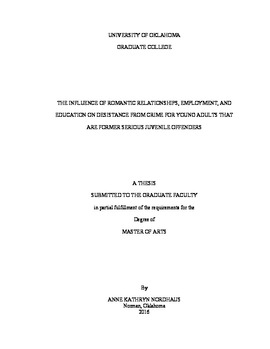The Influence of Romantic Relationships, Employment, and Education on Desistance from Crime for Young Adults that are Former Serious Juvenile Offenders
Abstract
Prior studies have determined that good marriages, employment, and education may decrease criminal offending for adult offenders. Much of the literature that addresses positive life events and desistance from crime has utilized samples comprised of adult offenders who have already begun to reduce their offending. As a result, further research is needed regarding which life events decrease offending within a high-risk group, namely serious juvenile offenders. According to the age-crime curve, even high rate offenders have significantly decreased their offending by early adulthood. However, which positive life events hasten this decline in offending is not well studied. Therefore, by utilizing the Pathways to Desistance data from the eighty-four month follow-up interviews when respondents were between the ages of twenty and twenty-six (N=788), this study furthered previous research by assessing which factors decrease the likelihood of offending for young adults who are former serious juvenile offenders. In particular, this study answers the following three questions. First, do higher levels of romantic relationship control decrease the likelihood of offending for young adults who are former serious juvenile offenders? Second, does greater commitment to employment decrease the likelihood of offending for young adults who are former serious juvenile offenders? Third, does greater commitment to education decrease the likelihood of offending for young adults who are former serious juvenile offenders? Results indicate that higher levels of romantic relationship control and greater commitment to employment decrease the likelihood of offending for young adults who are former serious juvenile offenders. Results also suggest that greater levels of commitment to education do not decrease the likelihood of offending for young adults who are former serious juvenile offenders.
Collections
- OU - Theses [2188]
